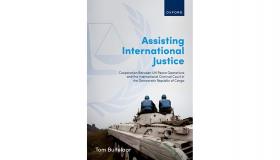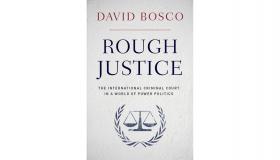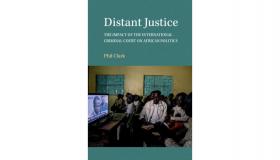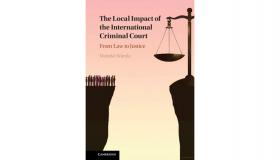
Breadcrumbs navigation
The best books on the effectiveness of international criminal courts
This article was originally published by Shepherd, a book discovery website where authors and experts share their favourite books. BISA has a partnership with Shepherd to showcase our members' books and this time it's the turn of Tom Buitelaar. Look out for further articles by BISA members in the coming weeks. Try their bookshelf on international relations or politics to browse a wide range of recommended books.
Why am I passionate about this?
In my graduate studies, I had a fantastic professor who was able to make the politics of international criminal justice one of my favorite subjects. The intersection of law, politics, peace, and conflict pulled me in. But the fact that it also touches on human rights, state sovereignty, and the prevention of mass atrocities got me hooked. I ended up doing extensive research on the International Criminal Court and how it interacts with UN peace operations, and I have subsequently been teaching peace and justice at Leiden University. I publish regularly on these topics as well and am the associate editor of International Peacekeeping, one of the leading journals on international conflict management.
I wrote...
Assisting International Justice: Cooperation Between UN Peace Operations and the International Criminal Court in the Democratic Republic of Congo

What is my book about?
My book is about the dilemmas faced by the UN and the International Criminal Court as they seek to collaboratively bring about peace and justice in some of the world’s worst conflicts. It tells the story of how the UN balanced the ICC’s requests for cooperation with other pressing needs.
Would it risk supporting the ICC even if this negatively impacted its relations with the host government? Would it risk arresting a war criminal who had just signed a peace deal while his followers might rebel? Would it risk sharing information that might expose some of the most vulnerable people to retaliation? The book produces valuable insights into the workings of international criminal justice and how it cooperates and conflicts with global conflict management institutions.
The books I picked & why
Rough Justice: The International Criminal Court in a World of Power Politics

Why did I love this book?
David Bosco is a journalist with excellent academic credentials. In this book, he produces work that is a superb combination of both. It is a riveting read, but also lays bare some of the key dynamics underlying how the International Criminal Court operates.
I know it’s a bit dated by now, but so many of the dynamics that Bosco discusses continue to be essential to understanding why international criminal justice isn’t just about the impartial application of the law but also can’t escape global power politics. I and many others interested in studying international criminal justice from a political angle continue to use it as a reference work.
Distant Justice: The Impact of the International Criminal Court on African Politics

Why did I love this book?
Many authors who write about international criminal justice forget that those who are the subject of criminal investigations have their own interests and goals in how they respond. The states in which these investigations take place try to use the courts and tribunals for their own purposes, like neutralizing opposition or presenting themselves as good international citizens.
In this book, Clark reports on his decade-long investigation into the effect of the ICC on politics in African states, especially the DRC and Uganda. I love how he draws on a variety of sources and hundreds of interviews to produce a detailed and nuanced story.
Justice in Conflict: The Effects of the International Criminal Court's Interventions on Ending Wars and Building Peace

Why did I love this book?
Mark Kersten is one of the world’s leading authorities on the role that criminal justice plays in conflict. This book is my favorite guide to understanding the effect that international criminal courts and tribunals can have in the midst of an ongoing conflict because Kersten studies the multifaceted effects that ICC intervention has.
In contrast to the advocates and skeptics, Kersten argues we should remain agnostic and also accept that the ICC may sometimes have no effect at all. I also think it’s a great example of how careful fieldwork in fragile contexts can lead to important insights on the validity of some of our assumptions of how international criminal justice works.
The Local Impact of the International Criminal Court: From Law to Justice

Why did I love this book?
If you want to have an informed conversation about the effectiveness of international criminal justice, it is vital to understand two things. One, that whether or not it’s effective entirely depends on how you measure ‘effectiveness’. And two, that the local context in which an international court operates is going to have a major effect on how effective it can be at anything.
I enjoyed Wierda’s book because she clearly works out these important starting points and studies the ICC’s impact in four very different countries: Afghanistan, Colombia, Libya and Uganda. She also is careful to distinguish between different kinds of effectiveness (systemic, transformative, reparative and demonstrative), enabling us to have much more sophisticated conversations about the results of ICC interventions.
Hiding in Plain Sight: The Pursuit of War Criminals from Nuremberg to the War on Terror

Why did I love this book?
Since international criminal courts and tribunals do not have their own police powers, they’re always dependent on the cooperation of others for the execution of their arrest warrants. Important here is that most of these courts do not allow for trials without the suspect in custody, making arrests a key condition for their effectiveness. I have always found the stories behind why some fugitives get arrested and others do not one of the most fascinating parts of international criminal justice.
This book tells the stories of several high-profile fugitives and how they were ultimately (not) arrested. It not only often reads like a detective thriller but also emphasizes the strong dependence on “the ebb and flow of political will” of states.
Image: OSeveno via Wikimedia Commons (upscaled), Attribution-ShareAlike 3.0 Unported

